小学英语一般将来时讲解与练习
六年级英语-一般将来时(含练习题)
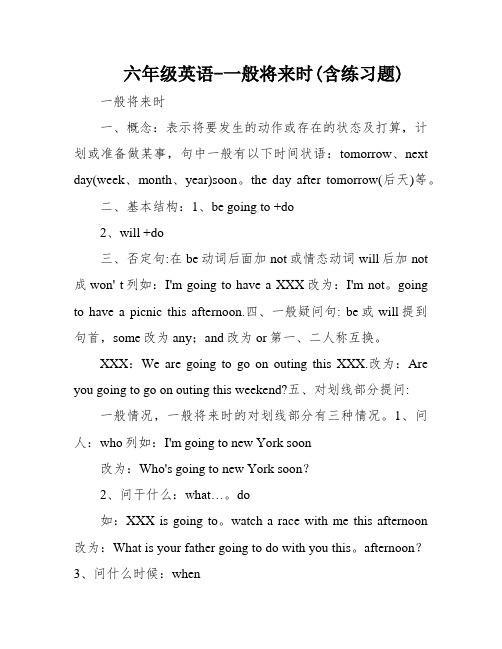
六年级英语-一般将来时(含练习题)一般将来时一、概念:表示将要发生的动作或存在的状态及打算,计划或准备做某事,句中一般有以下时间状语:tomorrow、next day(week、month、year)soon。
the day after tomorrow(后天)等。
二、基本结构:1、be going to +do2、will +do三、否定句:在be动词后面加not或情态动词will后加not 成won' t列如:I'm going to have a XXX改为:I'm not。
going to have a picnic this afternoon.四、一般疑问句: be或will提到句首,some改为any;and改为or第一、二人称互换。
XXX:We are going to go on outing this XXX.改为:Are you going to go on outing this weekend?五、对划线部分提问: 一般情况,一般将来时的对划线部分有三种情况。
1、问人:who列如:I'm going to new York soon改为:Who's going to new York soon?2、问干什么:what…。
do如:XXX is going to。
watch a race with me this afternoon 改为:What is your father going to do with you this。
afternoon?3、问什么时候:when列如:She's going to go to bed at nine 改为:When is going to bed?六、同义句:。
一般将来时专项练习讲解

一般将来时一.定义:一般将来时表示将来某个时间要发生的动作或存在的状态,常与一般将来时连用的时间状语有:时态标志tomorrow明天the day after tomorrow后天soon很快before long 不久this afternoon 今天下午in three days (weeks…) 三天(周……)后next week (month, year)下周(下个月、明年) some day 将来的某一天二、结构肯定句:①主语+ will / shall +动词(原形)+其他…I will buy some books tomorrow.②主语+ be going to + 动词(原形)+其他…否定句:①主语+ will / shall +not +动词(原形)+其他…I will not buy some books tomorrow.②主语+ be +not+ going to + 动词(原形)+其他…I am not going to buy some books tomorrow.疑问句:Will / Shall +主语+动词原形+其他…?Will you buy some books tomorrow?Be +主语+going to + 动词原形+其他…?Are you going to buy some books tomorrow?回答方式:肯定回答:① Yes,主语+will ② Yes,主语+ be否定回答:① No,主语+will +not ② No, 主语+be + not特殊疑问句:特殊疑问词+shall /will+主语+动词原型+其他…Where will you go next week? 下星期你去哪?What shall I do?我怎么办呢?How many books will they get? 他们将有多少本书?三区别.will, be going to …, be to…(高中), be about to(初中)…1.be going to +不定式,表示将来。
英语一般将来时专题练习(及答案)及解析
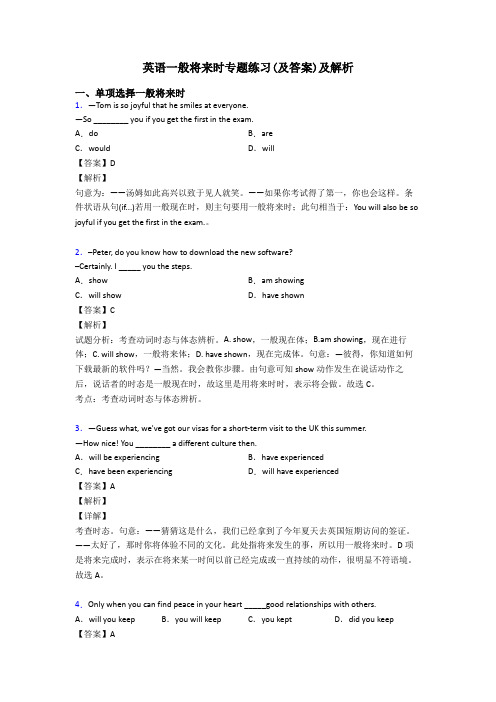
C.would have increasedD.will be increasing
【答案】B
【解析】
试题分析:考查时态。If条件句使用的是一般现在时代替一般将来时,所以主句也是一般将来时,和next year搭配使用。句意:如果我们的营销计划成功,我们明年销售将增加百分之三十。故B正确。
【解析】
句意为:——汤姆如此高兴以致于见人就笑。——如果你考试得了第一,你也会这样。条件状语从句(if...)若用一般现在时,则主句要用一般将来时;此句相当于:You will also be so joyful if you get the first in the exam.。
2.–Peter, do you know how to download the new software?
19.If he ________ exercise, he______ healthy.
A.not; will B.isn’t; won’t be
C.doesn’t; will be D.doesn’t do; won’t be
【答案】D
【解析】
【详解】
考查if条件句中的时态。句意:如果他不做运动,他就不会健康。If条件句,如果主句用一般将来时态,则从句用一般现在时态,且句子主语是he,单数第三人称,故选D。
考点:考查时态
10.It is required that the students _____ mobile phones in their school, so seldom _____ them using one.
A.should not use; you will see
小学英语一般将来时讲解与练习

小学英语一般将来时讲解与练习What are you going to do next Monday。
I'm going to play basketball.3.他们将要在周末去旅行。
They are going to travel on the weekend.4.你不会去看电影吗?Won't you go to watch a movie?5.她将在明天上午乘飞机去伦敦。
She is going to take a XXX.1.What are you going to do next Monday。
I plan to play basketball.2.Is your mother going to go shopping this weekend。
Yes。
she is。
She wants to buy some fruit.4.When do you plan to meet?5.Nancy is not going to go camping.6.Are you going to get up at 6:30 tomorrow?7.Will we meet at the bus。
at 10:30?8.What is she going to do after school?XXX are going to see a play the day after tomorrow.11.Today is a sunny day。
We are going to have a XXX.12.My brother will be going to Shanghai next week.13.Tom usually walks to school。
but today it's raining so he will go by bike.14.What do you usually do on weekends。
六年级英语一般将来时讲解加练习
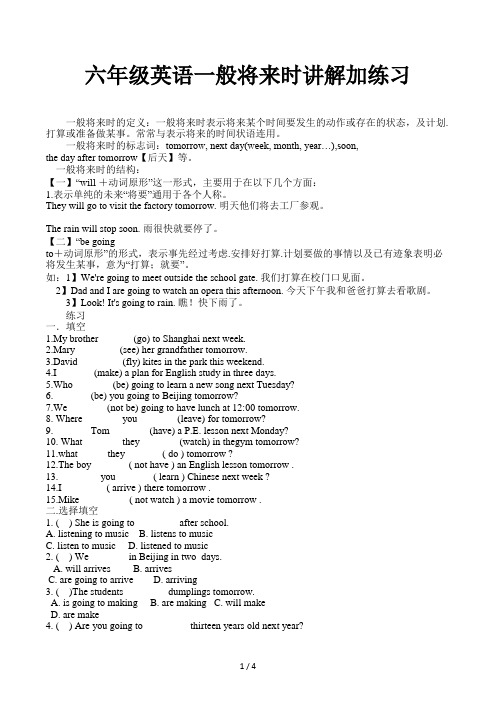
六年级英语一般将来时讲解加练习一般将来时的定义:一般将来时表示将来某个时间要发生的动作或存在的状态,及计划.打算或准备做某事。
常常与表示将来的时间状语连用。
一般将来时的标志词:tomorrow, next day(week, month, year…),soon,the day after tomorrow【后天】等。
一般将来时的结构:【一】“will +动词原形”这一形式,主要用于在以下几个方面:1.表示单纯的未来“将要”通用于各个人称。
They will go to visit the factory tomorrow. 明天他们将去工厂参观。
The rain will stop soon. 雨很快就要停了。
【二】“be goingto+动词原形”的形式,表示事先经过考虑.安排好打算.计划要做的事情以及已有迹象表明必将发生某事,意为“打算;就要”。
如:1】We're going to meet outside the school gate. 我们打算在校门口见面。
2】Dad and I are going to watch an opera this afternoon. 今天下午我和爸爸打算去看歌剧。
3】Look! It's going to rain. 瞧!快下雨了。
练习一.填空1.My brother ______ (go) to Shanghai next week.2.Mary ________ (see) her grandfather tomorrow.3.David ________ (fly) kites in the park this weekend.4.I_______ (make) a plan for English study in three days.5.Who _______ (be) going to learn a new song next Tuesday?6._______ (be) you going to Beijing tomorrow?7.We _______ (not be) going to have lunch at 12:00 tomorrow.8. Where _______ you _______ (leave) for tomorrow?9._______ Tom _______ (have) a P.E. lesson next Monday?10. What _______ they _______ (watch) in thegym tomorrow?11.what _____ they _______( do ) tomorrow ?12.The boy _______( not have ) an English lesson tomorrow .13.________ you _______( learn ) Chinese next week ?14.I ________ ( arrive ) there tomorrow .15.Mike _________ ( not watch ) a movie tomorrow .二.选择填空1. ( ) She is going to ________ after school.A. listening to musicB. listens to musicC. listen to musicD. listened to music2. ( ) We _______ in Beijing in two days.A. will arrivesB. arrivesC. are going to arriveD. arriving3. ( )The students ________ dumplings tomorrow.A. is going to makingB. are makingC. will makeD. are make4. ( ) Are you going to_________ thirteen years old next year?A. will beB. areC. beD. go5. ( ) ___will see a play in 5 days?A. WhenB. WhatC. WhoD. Whose6. ( ) Mary______ English next year.A. will learnB. will to learnC. are going to learn.D. learns7. ( ) He’ll _____ shopping this afternoon.A. goingB. goC. goesD. went8. ( ) Will you ____ at the bus stop at 10:30?A. meetingB. meetsC. meetD. met9. ( ) Lily and I _______ the guitar. next week.A. am going to playB. are going to playC. will playsD. play10. ( ) How ______ Jenny ___ home tomorrow?A. does......goB. is……goingC. will……goD. do……g o11. ( ) Who is going to _________ a song ?A. sings B singing C. to sing D. sing12. ( ) I _________in Beijing in three days.A. are going to arriveB. arriveC. will arriveD. arrives13. ( ) He _______some model planes tomorrow .A. going to makeB. is makingC. will make D makes14. ( ) Are you going to ___________a doctor next year ?A. will beB.. areC. beD. are going to15. ( ) She ________ you make supper this evening .A. helpsB. will helpC. is helpingD. is going help三.把下列句子变成一般疑问句,并给出肯定和否定回答。
一般将来时讲解及练习(含答案)
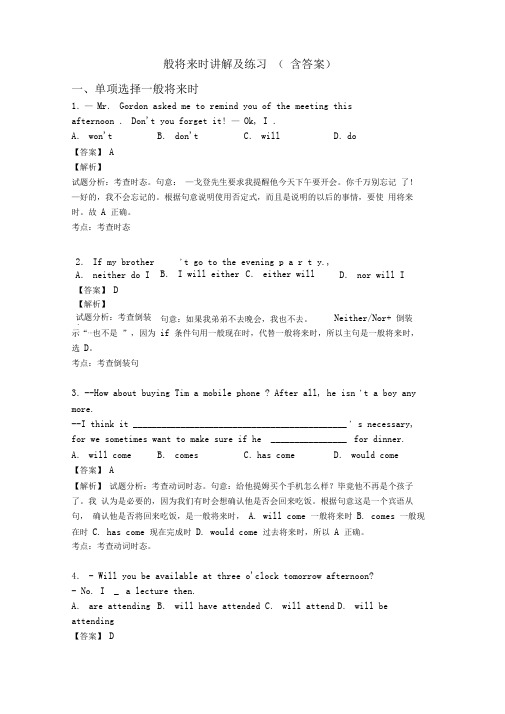
般将来时讲解及练习(含答案)一、单项选择一般将来时1.—Mr.Gordon asked me to remind you of the meeting thisafternoon .Don't you forget it! —Ok, I .A.won't B.don't C.will D.do【答案】A【解析】试题分析:考查时态。
句意:—戈登先生要求我提醒他今天下午要开会。
你千万别忘记了!—好的,我不会忘记的。
根据句意说明使用否定式,而且是说明的以后的事情,要使用将来时。
故A 正确。
考点:考查时态2.If my brother doesn 't go to the evening p a r t y.,A.neither do I B.I will either C.either willI D.nor will I【答案】D 【解析】试题分析:考查倒装句:句意:如果我弟弟不去晚会,我也不去。
Neither/Nor+ 倒装句,表示“⋯也不是”,因为if 条件句用一般现在时,代替一般将来时,所以主句是一般将来时,选D。
考点:考查倒装句3.--How about buying Tim a mobile phone ? After all, he isn 't a boy any more.--I think it _____________________________________________ ' s necessary, for we sometimes want to make sure if he ________________ for dinner. A.will come B.comes C.has come D.would come【答案】A【解析】试题分析:考查动词时态。
句意:给他提姆买个手机怎么样?毕竟他不再是个孩子了。
我认为是必要的,因为我们有时会想确认他是否会回来吃饭。
小学一般将来时讲解

小学一般将来时讲解1. 介绍小学一般将来时是英语语法中的一种时态,用来表示将来发生的行动或事件。
在这种时态中,动作与时间的关系是相对的,即动作将在将来某一时刻发生。
2. 构成小学一般将来时由情态动词 "will" 或 "shall" 加上动词原形构成。
下面是一些例子:- I will go to school.- She will play basketball.- We shall see a movie.3. 肯定句结构小学一般将来时的肯定句结构是:主语 + will/shall + 动词原形+ 其他。
4. 否定句结构小学一般将来时的否定句结构是:主语 + will/shall + not + 动词原形 + 其他。
5. 疑问句结构小学一般将来时的疑问句结构是:Will/Shall + 主语 + 动词原形+ 其他?6. 使用场景小学一般将来时常用于以下场景:- 表示未来的计划或打算:I will go to the park tomorrow.- 表示预测:It will rain later.- 表示意愿或请求:Will you help me with my homework?7. 注意事项在小学一般将来时中,我们要注意以下几点:- 不使用"will"或"shall"来表达对他人的承诺或决定,如"I promise"或"I decide"。
- 在口语中,经常使用"will"而不是"shall"。
- 在第一人称疑问句中,我们可以使用"shall"代替"will",但这并不常见。
希望这份文档对你的小学一般将来时的学习有所帮助!。
小学英语语法一般将来时(包括练习)
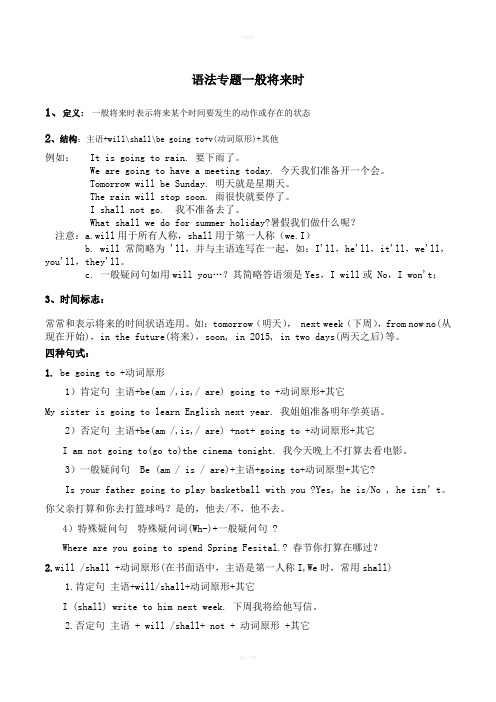
语法专题一般将来时1、定义:一般将来时表示将来某个时间要发生的动作或存在的状态2、结构:主语+will\shall\be going to+v(动词原形)+其他例如: It is going to rain. 要下雨了。
We are going to have a meeting today. 今天我们准备开一个会。
Tomorrow will be Sunday. 明天就是星期天。
The rain will stop soon. 雨很快就要停了。
I shall not go. 我不准备去了。
What shall we do for summer holiday?暑假我们做什么呢?注意:a.will用于所有人称,shall用于第一人称(we.I)b. will 常简略为 'll,并与主语连写在一起,如:I'll,he'll,it'll,we'll,you'll,they'll。
c. 一般疑问句如用will you…?其简略答语须是Yes,I will或 No,I won't;3、时间标志:常常和表示将来的时间状语连用。
如:tomorrow(明天), next week(下周),from now no(从现在开始),in the future(将来),soon, in 2015, in two days(两天之后)等。
四种句式:1. be going to +动词原形1)肯定句主语+be(am /,is,/ are) going to +动词原形+其它My sister is going to learn English next year. 我姐姐准备明年学英语。
2)否定句主语+be(am /,is,/ are) +not+ going to +动词原形+其它I am not going to(go to)the cinema tonight. 我今天晚上不打算去看电影。
- 1、下载文档前请自行甄别文档内容的完整性,平台不提供额外的编辑、内容补充、找答案等附加服务。
- 2、"仅部分预览"的文档,不可在线预览部分如存在完整性等问题,可反馈申请退款(可完整预览的文档不适用该条件!)。
- 3、如文档侵犯您的权益,请联系客服反馈,我们会尽快为您处理(人工客服工作时间:9:00-18:30)。
小学英语一般将来时讲解及练习一、一般将来时的定义:一般将来时表示在将来时间将要发生的动作或存在的状态,与表示将来的时间连用。
tomorrow, next day(week, month, year,),soon,the day after tomorrow (后天)等。
如: She will visit Shanghai tomorrow.二、一般将来时的构成1.一般将来时有两种构成形式:(1)主语 +shall/will+do(2)主语 + be going to + do在表示“打算到某地去时”由于谓语动词 go 与 going 重复,一般可以只说be going to a place。
三、一般将来时的用法1.(1)主语 +shall/will+do(will可用于所有人称,shall只用于第一人称 I和we)这种结构不是表示自己的打算、意图或计划,而是表示未来的事实或对将来的预测等如:No one will do heavy work.Roberts will do everything for us.(2)主语 + be going to + do这种结构常用来表达自己打算做某事、计划做某事或者有意做某事。
注意:be动词要与主语的人称和数一致,如:I am going to do some reading tomorrow.He is going to have a piano lesson next week.We are going to have a party this Friday.2.通常情况下 will和be going to能互换,但是be going to与will用法的也是有点区别的(1)只用 will不用be going to的情况:①表示对未来时间与年龄的推测时,如:Tomorrow will be Monday.She will be thirteen next year.②表示必然发生时 , 如:Fish will die without water.People will die if all green plants die.(2)只用 be going to而不用will的情况:如果表示已有迹象表明在不久的将来要发生的事情时,如:Look at those black clouds, It’s going to rain.3.某些动词如:go/come/leave/start/begin/arrive等,它们的现在进行时可以表示将来时,如:They are leaving for Shanghaitomorrow.My brother is coming here soon.四、一般将来时的句式变换肯定句:主语 +shall/will+do主语 + be going to + do否定句:主语 +shall/will+not+do(will not可缩写成won’t)主语 + be+ not+ going to +do一般疑问句: shall/will+主语+ dobe+主语+going to+do特殊疑问句:疑问词 + shall/will+主语+do疑问词 +be+主语 +going to+do一般将来时练习题 :一、用单词的适当形式填空。
1. I _______ ________ _______ _______ (see) a film tomorrow.2. A: What _______ you _______ ______ _______ (do) next Saturday ?B:I _______ __________ _______ ________(swim) with my parents.3. There _____________ (be) a party in our school.4. Mike _______ ________ (visit ) his grandparents next week.5. He __________________________(buy)a bike the day after tomorrow.6. ________(fly)a kite with my father next week.7. He will not _________ (go) school tomorrow.二、选择题( () 1. There __________ a meeting tomorrow afternoon.A. will be going toB. will going to beC. is going to beD. will go to be ) 2. Charlie ________ here next month.A. isn’t workingB. doesn’t workingC. isn’t going to workingD. won’t work( ) 3. He ________ very busy this week, he ________ free nextweek.A. will be; isB. is; isC. will be; will beD. is; will be( ) 4. There ________ a dolphin show in the zoo tomorrow evening.A. wasB. is going to haveC. will haveD. is going to be() 5.–________ you ________ free tomorrow?(–No. I ________ free the day after tomorrow.A. Are; going to; willB. Are; going to be; willC.Are; going to; will beD.Are; going to be;) 6. Mother ________ me a nice present on my next birthday.A. will givesB. will giveC. givesD. givewill be() 7.– Shall I buy a cup of tea for you?–________.(不,不要。
)A. No, you won’t.B. No, you aren’t.C. No, please don’t.D. No, please.() 8.– Where is the morning paper?–I ________ if for you at once.A. getB. am gettingC. to getD. will get() 9. ________ a concert next Saturday?A. There will beB. Will there beC. There can beD. There are() 10. If they come, we ________ a meeting.A. haveB. will haveC. hadD. would have() 11. He ________ her a beautiful hat on her next birthday.A. givesB. gaveC. will givingD. is going to giving() 12. He ________ to us as soon as he gets there.A. writesB. has writtenC. will writeD. wrote() 13. He ________ in three days.A. coming backB. came backC. will come backD. is going to coming back() 14. If it ________ tomorrow, we’ll go roller-skating.A. isn’t rainB. won’t rainC. doesn’t rainD. doesn’t fine()15. – Will his parents go to see the Terra Cotta Warriors tomorrow?– No, ________ (不去) .A. they willn’t.B. they won’t.C. they aren’t.D. they don’t.( ) 16. Who ________ we ________ swimming with tomorrow afternoon?A. will; goB. do; goC. will; goingD. shall; go( ) 17. We ________ the work this way next time.A. doB. will doC. going to doD. will doing( ) 18. Tomorrow he ________ a kite in the open air first, andthen ________ boating in the park.A. will fly; will goB. will fly; goesC. is going to fly; will goesD. flies; will gomatch. ( )19. The day after tomorrow they ________ a volleyballA. will watchingB. watchesC. is watchingD. is going to watch( ) 20. There ________ a birthday party this Sunday.A. shall beB. will beC. shall going to beD. will going to be( ) 21. They ________ an English evening next Sunday.A. are havingB. are going to haveC. will havingD. is going to have( ) 22. ________ you ________ free next Sunday?A. Will; areB. Will; beC. Do; beD. Are; be( ) 23. He ________ there at ten tomorrow morning.A. willB. isC. will beD. be( ) 24. ________ your brother ________ a magazine from the library?A. Are; going to borrow C. Will; borrowsB. Is; going to borrow D. Are; going to borrows( ) 25.–Shall I come again tomorrow afternoon?–________ (好的) .A. Yes, pleaseB. Yes, you will.C. No, please.D. No, you won’t. ( ) 26. It ________ the year of the horse next year.A. is going to beB. is going toC. will beD. will is( ) 27. ________ open the window?A. Will you pleaseB. Please will youC. You pleaseD. Do you( ) 28.–Let’s go out to play football, shall we?– OK. I ________.A. will comingB. be going to comeC. comeD. am coming() 29. It ________ us a long time to learn English well.A. takesB. will takeC. spendsD. will spend() 30. The train ________ at 11.A. going to arriveB. will be arriveC. is going toD. is arriving。
